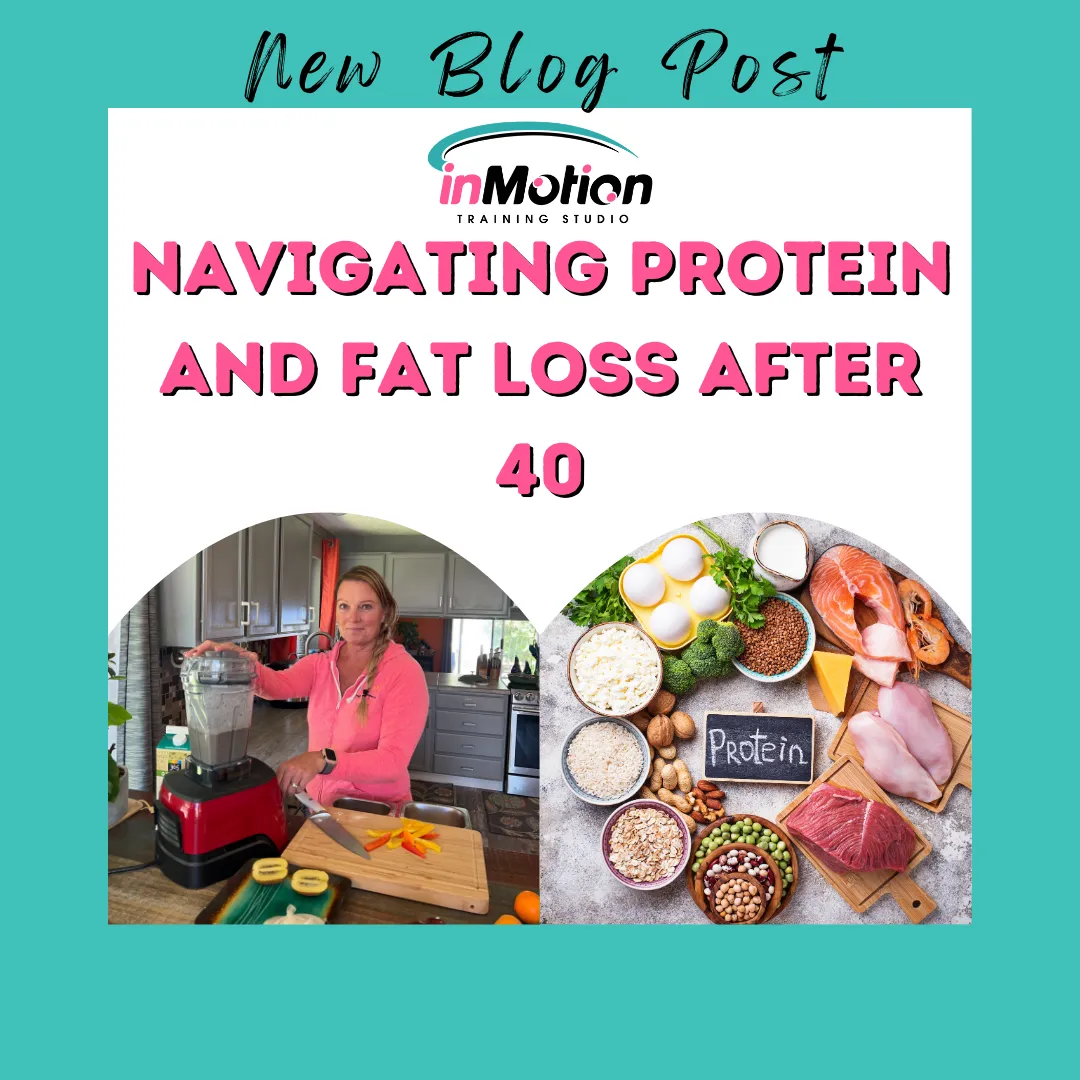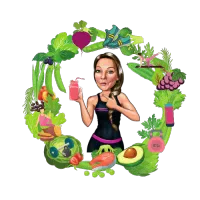blog | inmotion training studio

Navigating Protein and Fat Loss After 40

Embarking on a journey to shed unwanted pounds after the age of 40 requires a nuanced approach to nutrition and fitness with a particular focus on protein intake and strength training.
You may have heard when it comes to weight loss, protein is King. Protein helps support weight loss by regulating the hormones that control hunger and fullness, and because Protein is the more satiating of the macronutrients, increasing intakes will also help you feel fuller longer. And increasing daily Protein has been shown to help prevent muscle loss and support healthy metabolism.
The Importance of Protein: As we age, our bodies undergo various changes, including a natural decline in muscle mass and metabolism. Protein becomes a key player in the quest for fat loss, as it supports muscle maintenance and growth while enhancing the thermic effect of food—meaning it burns more calories during digestion. Additionally, protein helps keep you feeling full, reducing the likelihood of overeating and supporting sustainable weight loss.
Protein is the essential building block of almost everything inside your body. Your body uses it to make enzymes, hormones, and neurotransmitters, making it an essential part of day-to-day function and a healthy part of a well-balanced diet. Especially for women over 40.
And if you're a woman who's active, listen up! Consuming Protein before your workout has been shown to enhance muscle growth, improve muscle recovery, and increase overall strength and performance.
And in case you're not sold on it yet, there are plenty of other reasons to love it. For example, adding Protein to your plate has been shown to help promote fat loss. Out of all the macronutrients, research has found that Protein is by far the most filling. And that's great news for not only fat loss, but reducing overeats and late night snacking too, because if you’re feeling satisfied after eating a Protein-rich meal, over-indulging later is far less likely to happen.
How Much Protein Do You Need, Especially Over 40? While protein needs vary based on factors like activity level, body weight, and overall health, a general guideline for adults is around 1.6 and 2.2 grams of protein per kilogram of body weight (.73 and 1 grams per pound). Athletes and heavy exercisers should consume 2.2-3.4 grams of protein per kilogram (1-1.5 grams per pound) if aiming for weight loss. I usually tell most of my clients to aim for their body weight in grams or their ideal body weight if they have more than 10 pounds to lose. Most people have a hard time hitting 100 grams let alone if they weigh 150 and are trying to hit 150 so getting at least 100 is a good starting point. This adjustment helps counteract the natural decline in muscle mass and promotes optimal protein synthesis.
The Significance of Amino Acids: Proteins are composed of amino acids, often referred to as the building blocks of life. There are a total of 20 amino acids in our bodies, nine essential amino acids that the body cannot produce on its own and must be obtained through diet. Consuming a variety of protein sources ensures you get all essential amino acids, supporting overall health and well-being.
While animal meats and dairy products have traditionally been considered the primary source for Protein, you can find it in a variety of other food sources too.
Plant based proteins, for example, have become increasingly popular over the last decade for a variety of reasons, such as a the desire to create healthier food habits, complement lifestyle preferences, reduced food cost, increased access and availability, etc. For individuals that rely solely on plant Proteins (i.e. vegetarians and vegans), it's especially important to understand how you can get those complementary Protein combinations to obtain those essential amino acids.
Foods to Support Your Protein Goals:

Lean meats such as chicken, turkey, and lean cuts of beef.
Fatty fish like salmon and trout, rich in omega-3 fatty acids.
Eggs, a complete protein source with all essential amino acids.
Dairy products, including Greek yogurt and cottage cheese.
Legumes and beans, such as lentils, chickpeas, and black beans.
Nuts and seeds, like almonds, chia seeds, and pumpkin seeds.
Vegetarian Protein Sources: For those following a vegetarian or plant-based diet, ample protein options exist:
Tofu and tempeh provide complete protein.
Quinoa is a versatile grain with all essential amino acids.
Edamame and other soy products.
Lentils and chickpeas are excellent sources of plant-based protein.
Complementary Vegetarian Protein Combinations: To ensure you receive all essential amino acids, combine complementary plant-based protein sources:

Brown rice with beans or lentils.
Hummus (chickpeas) with whole-grain pita.
Quinoa salad with mixed vegetables and tofu.
Peanut butter on whole-grain toast.
Bottom Line: For effective fat loss after 40, prioritize a balanced diet rich in protein, complemented by regular exercise. Tailoring your protein intake to your specific needs, focusing on amino acid diversity, and incorporating a variety of protein sources—whether animal or plant-based—will support your weight loss goals and overall well-being. If you're a women over 40, getting in enough protein each day is key to supporting hormone health, metabolism, bone and muscle health. Studies show that a well-balanced diet of lean proteins, complex carbohydrates and healthy fats not only support healthy body function, but also reduce risk of disease and a healthy waistline. Remember, it's never too late to optimize your nutrition and achieve lasting results on your fitness journey.
Power up with Protein!
Ready to make eating better for weight loss feel simple and doable so you can quit yo-yo dieting and lose weight for the last time? Click Here to book your free Active Aging strategy session with me where I'll help you get unstuck using a simple and personalized process.


inMotion Training Studio
Shannon Segerstrom owner of inMotion Training Studio, Personal Trainer, Holistic health Coach, Functional Nutrition and Metabolism Specialist in Bend Oregon.
In motion training studio - bend
social media
REQUEST MORE INFORMATION
change you can do & results you will see







